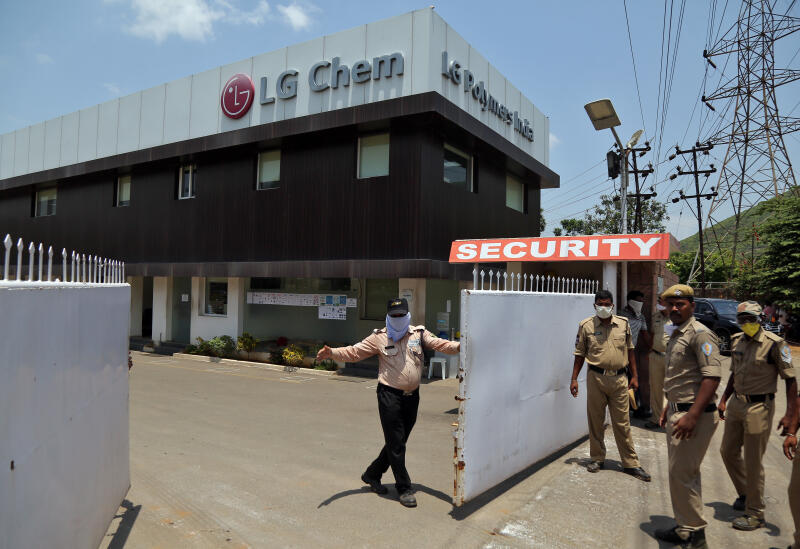Toxic gas leak factory in India operated without an environmental permit for 23 years
Sign up now: Get insights on Asia's fast-moving developments

The gas leak left 12 people dead and hundreds unwell.
PHOTO: REUTERS
Follow topic:
BANGALORE - The South Korean polymer factory near Vishakapatnam, in the southern Indian state of Andhra Pradesh, which leaked toxic gas last week lacked mandatory environmental clearances.
The incident left 12 people dead and hundreds unwell.
Experts say the revelation exposes a dangerous gap in India's enforcement of environmental laws.
The LG Polymers factory, owned by South Korea's biggest chemical company, LG Chem, admitted in an affidavit on May 10 last year that it had not obtained environmental clearance for its plant since 1997. The official document was submitted to the state Environment Impact Assessment Authority as part of the company's application for an expansion.
LG Polymers wrote: "As on this date, our industry does not have a valid environmental clearance substantiating the produced quantity, issued by the competent authority, for continuing operations."
The petrochemical-based factory is classified under hazardous industries under Indian law. To operate, it needs a federal environmental clearance, granted by the Ministry of Environment after an environmental impact assessment, which includes measuring the ecological consequences to soil, water and air, and consulting residents near the factory.
The assessment has been mandatory for such industries since 2006.
Ms Geeta Menon, joint secretary of the environment ministry, told The Hindustan Times that the polymer plant was "a very old project" established before the environmental impact assessment notification was applicable. Started in 1961, the polymer manufacturer was bought by LG Chem in 1997.
From 2004 to 2016, the factory expanded its production capacity from 280 to 415 tonnes per day. The only official permission for operations it had was from the state Andhra Pradesh Pollution Control Board. Such state permits are often automatically renewed.
In March 2017, the federal environment ministry announced a one-time opportunity for "violators" - old units that did not have permits - to apply for environmental clearance.
LG Polymers did not apply in the six-month window.

Instead, in April 2018, the company applied to state environment authorities for clearance to expand its capacity further to 655 tonnes per day.
The state agency asked for more information, which the company provided in May 2019, admitting that it had never sought or received environmental clearance. In June, realising the unit was a highly polluting one, the state agency suggested that the company apply to the federal ministry.
Records show that LG Polymers did apply to the federal ministry for an expansion on Jan 2, 2018, but withdrew the submission in a day, citing "typo errors". Ms Menon said there was "confusion" on whether it would be assessed by the state or by the environment ministry.
The state transferred the application to the Indian government only last month, she added.
The company thus operated for 23 years without environment clearance, and no state or federal agency closed down the unit.
LG Chemical representatives in South Korea, LG Polymers representatives in Vishakhapatnam and Gurgaon, and the environment ministry's joint secretary did not respond to e-mailed queries from The Straits Times.
Andhra Pradesh officials said they regretted that the factory had gone virtually unmonitored.
"The incident with LG Polymers shows us that the company was allowed to continue operations and seek expansions when it didn't even have initial clearance. Violators can't be routinely regularised because it's not simply a legal matter. As the gas leak shows us, illegality has huge and dangerous implications to the environment and human life," said Ms Kanchi Kohli, a senior researcher at the Delhi-based Centre for Policy Research.
Indian manufacturing rules classify styrene, the leaked gas, as "hazardous and toxic". About 1,500 residents at the factory's location at Venkatapuram were evacuated on the day of the leak after they reported breathing difficulties and burning eyes, and many fell unconscious.
The gas leak is now being investigated. The state police chief has said that liquid styrene in tanks had vaporised as it had not been stored at the required temperature when the factory was closed because of the nationwide lockdown ordered by the federal government to curb the spread of the coronavirus.
The National Green Tribunal, a dedicated environmental court, has directed the LG Polymers management to make an initial deposit of 500 million rupees (S$9.4 million) towards compensation to the victims. The state government is considering moving the factory out of the densely populated area.
Andhra Pradesh's Minister for Industries has now identified 86 companies in the state which will be allowed to restart only after safety audits and government clearance.

